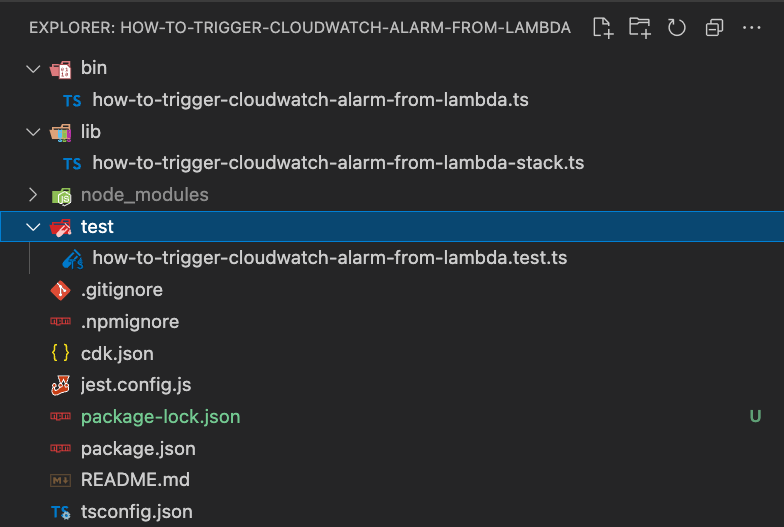In this post, we are going to use the AWS CDK and TypeScript to build a Lambda Function that triggers a CloudWatch Alarm that sends an email when an invocation error occurs.
All of the code can be found in this repository.
Setup
We need to run a few commands to set up our CDK app.
mkdir how-to-trigger-cloudwatch-alarm-from-lambda
cd how-to-trigger-cloudwatch-alarm-from-lambda
npx cdk init app --language typescript
This should build the following directory structure.

Also, make sure to have the AWS CLI configured. For more information follow the AWS CLI quickstart guide.
Create the Lambda Function
Deploying a Lambda function requires bootstrapping the CDK app which builds an S3 bucket where the Lambda's source code will live. This is a one-time operation.
npx cdk bootstrap
Install esbuild so the TypeScript can be efficiently compiled and minified into JavaScript. This isn't a requirement, but having esbuild installed will bypass the need for docker.
npm install -D esbuild
Create src/index.ts and paste the following code which will throw an error on invocation.
export function handler() {
throw new Error("error");
}
Open lib/how-to-trigger-cloudwatch-alarm-from-lambda.ts and define the new Lambda function.
const nodejsFunction = new NodejsFunction(
this,
"how-to-trigger-cloudwatch-alarm-from-lambda",
{
handler: "handler", // The name of the TypeScript function to invoke.
runtime: Runtime.NODEJS_14_X, // The Node.js runtime to use.
entry: "src/index.ts", // The TypeScript file that contains the handler function.
}
);
Now let's deploy the Stack to AWS.
npx cdk deploy --require-approval never
Create the CloudWatch Alarm
Open lib/how-to-trigger-cloudwatch-alarm-from-lambda.ts and add the CloudWatch Metric and Alarm.
const numberOfFunctionErrors = nodejsFunction.metricErrors( // Capture invocation errors.
{
period: Duration.minutes(1), // Sum invocation errors each minute.
}
);
const alarm = new Alarm(
this,
"how-to-trigger-cloudwatch-alarm-from-lambda-alarm",
{
metric: numberOfFunctionErrors, // Watch the number of invocations.
threshold: 1, // Compare to the threshold of 1.
evaluationPeriods: 1, // Look within the context of 1 evaluation period.
comparisonOperator:
ComparisonOperator.GREATER_THAN_OR_EQUAL_TO_THRESHOLD, // Trigger if greater than or equal to 1.
}
);
## Create the SNS Email Subscription
Open `lib/how-to-trigger-cloudwatch-alarm-from-lambda.ts` and add the SNS Topic, Email Subscription and SNS Action.
```typescript
const topic = new Topic(
this,
"how-to-trigger-cloudwatch-alarm-from-lambda-topic"
);
topic.addSubscription(new EmailSubscription("your@email.com")); // Add a new email subscription to the SNS topic.
alarm.addAlarmAction(new SnsAction(topic)); // Add a new SNS Action to the CloudWatch Alarm.
Stack Summary
After piecing everything together, your lib/how-to-trigger-cloudwatch-alarm-from-lambda.ts should look like this.
import { Duration, Stack, StackProps } from "aws-cdk-lib";
import { Construct } from "constructs";
import { NodejsFunction } from "aws-cdk-lib/aws-lambda-nodejs";
import { Runtime } from "aws-cdk-lib/aws-lambda";
import { Alarm, ComparisonOperator } from "aws-cdk-lib/aws-cloudwatch";
import { Topic } from "aws-cdk-lib/aws-sns";
import { EmailSubscription } from "aws-cdk-lib/aws-sns-subscriptions";
import { SnsAction } from "aws-cdk-lib/aws-cloudwatch-actions";
export class HowToTriggerCloudwatchAlarmFromLambdaStack extends Stack {
constructor(scope: Construct, id: string, props?: StackProps) {
super(scope, id, props);
const nodejsFunction = new NodejsFunction(
this,
"how-to-trigger-cloudwatch-alarm-from-lambda",
{
handler: "handler",
runtime: Runtime.NODEJS_14_X,
entry: "src/index.ts",
}
);
const numberOfFunctionErrors = nodejsFunction.metricErrors({
period: Duration.minutes(1),
});
const alarm = new Alarm(
this,
"how-to-trigger-cloudwatch-alarm-from-lambda-alarm",
{
metric: numberOfFunctionErrors,
threshold: 1,
evaluationPeriods: 1,
comparisonOperator:
ComparisonOperator.GREATER_THAN_OR_EQUAL_TO_THRESHOLD,
}
);
const topic = new Topic(
this,
"how-to-trigger-cloudwatch-alarm-from-lambda-topic"
);
topic.addSubscription(new EmailSubscription("your@email.com")); // Update with your email!
alarm.addAlarmAction(new SnsAction(topic));
}
}
Let's do one final deployment.
npx cdk deploy --require-approval never
Testing
Let's use the AWS CLI to test everything.
First, let's get the Lambda Function name, which can be found using the following command
aws lambda list-functions
Next, using the Lambda Function name from the previous command, use the AWS CLI to invoke the Lambda Function.
aws lambda invoke \
--function-name "HowToTriggerCloudwatchAla-howtotriggercloudwatchal-aYncvjc4a5RT" \
response.json
Wait about a minute and check the email address that was configured for the SNS Email subscription. If all went well, an email should have been sent with a subject similar to ALARM: "HowToTriggerCloudwatchAlarmFromLambdaStack-howtotriggercloudwat..." in US East (N. Virginia)
Clean Up
Don't forget to delete the stack when finished!
npx cdk destroy
Thanks for reading! If you found this useful, please follow me here https://dev.to/thealexkates https://twitter.com/thealexkates